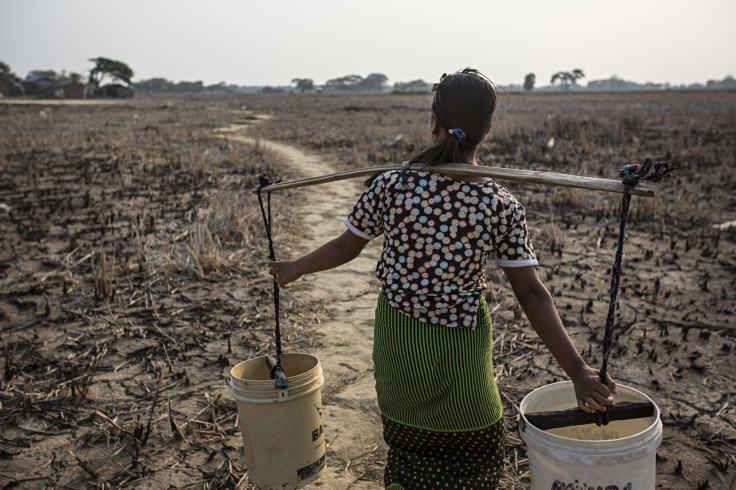Study: India's Rising Suicide Rate Linked To Climate Change Effects

Nearly 60,000 people have committed suicide in India because of climate change over the last 30 years, a study released this week said.
Farmers whose harvests fail to take off are left in poverty, leading them to commit suicide, the study, published in the Proceedings of the National Academy of Sciences, suggests.
Read: Gulf Of Mexico Sees Largest 'Dead Zone' Recorded, Size Of New Jersey
Whenever a day’s temperature is above 68 degrees fahrenheit and sees an increase of 1.8 degrees fahrenheit (one degree celsius), India records about 65 suicides in a single day. Heat leads to harvest loss, which can then increase food prices, less jobs and a hole in household savings. When that happens, a large number of people in India, mostly male heads of household, commit suicide.
“Each life claimed by suicide is devastating,” Tamma Carleton, the UC Berkeley researcher who conducted the study, told International Business Times. “It was both shocking and heartbreaking to see that thousands of people face such bleak conditions that they are driven to harm themselves.”
More than 75 percent of worldwide suicides occur in developing nations, with India taking one-fifth of the incidents. Suicide numbers have increased overall in India, where more than 130,000 take their own lives each year. Suicide rates have doubled since 1980 in the country. The study suggests seven percent of the increase is linked to climate change.
The findings shows climate change is already affecting humans, and it will continue to change as temperatures rise. Carleton predicts the numbers will increase as the planet gets warmer.
“This finding is incredibly worrying,” Carleton said. “Without substantial investments in adaptation, we are likely to see a growing number of lives lost to self-harm as climate change continues to unfold and temperatures rise.”
The rain-dependent agriculture industry in India employs more than half of the country’s population, with a third of India’s workers earning below the international poverty line. The industry isn’t stable, since it’s sensitive to climate events, like unpredictable monsoons, heat waves and drought.
“These are farmers facing extremely stressful and difficult conditions," said Carleton. "High quality seeds are expensive, credit markets in rural areas don’t function well, and crop insurance is rarely available. In this risky environment where families are already very poor, any additional shock can lead to extreme economic destitution, and some individuals may cope with that hardship by committing suicide.”
Read: Survey: ISIS And Climate Change Seen As Biggest National Security Threats
Protecting employees from economic hurdles may reduce suicides. Policies like crop insurance or improvements in rural credit markets could help.
“My findings suggest that policies like crop insurance, which protect farm incomes from the vagaries of the climate, could be successful in reducing suicides,” said Carleton. “Access to low-interest loans through well-functioning rural credit markets may also help limit the damage caused by warming temperatures."
In response to the suicide rate linked to climate change, the Indian government set up a $1.3 billion crop insurance plan in an effort to decrease deaths.
Climate Change And Mental Health
Meanwhile, other studies have shown a link between mental health and climate change. A study published this spring in the American Journal of Nursing said significant changes in climate can increase conflicts, like interpersonal aggression as domestic violence, assault and rape. Researchers believe that acts of violence and aggression happen more frequently when temperatures rise.
A study from Australia found mental and behavioral disorders are linked to heat waves. Researchers there found heat waves were associated with increased rates of admissions for mental disorders, and were linked to mood disorders, anxiety disorders, dementia, anxiety related disorders and others.
Climate change is fueling stronger storms, floods and wildfires, which means victims are at risk for developing mental illness after the events. Researchers estimate 25 percent to 50 percent of those who experience extreme weather event undergo negative mental health outcomes. Typical responses to a disaster, include hypervigilance, avoidance, anger, flashbacks, guilt, anxiety, emotionality, difficulty concentrating, rumination, preoccupation, and social withdrawal. For example, after Hurricane Katrina researchers found that 62 percent of the evacuees they studied were suffering of acute stress disorder. Scientists also found a significant increase in suicidal ideation and suicide plans among those affected by Katrina who were surveyed five to seven months after the disaster and again a year later.
Although many people see their symptoms resolve over time, some go on to develop mental disorders, including depression and posttraumatic stress disorder (PTSD).
© Copyright IBTimes 2024. All rights reserved.




















